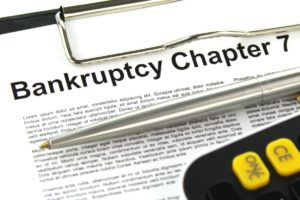
As we discussed in the prior post about bankruptcy exemptions, each State has a specific set of exemptions you use to protect property such as your home, car, and retirement account when filing a Chapter 7 or Chapter 13 bankruptcy case. Again, exemptions are important because if property is not protected in a Chapter 7 case, then the Bankruptcy Trustee may sell that property. And, in a Chapter 13 Bankruptcy unprotected property impacts the amount of your plan payments.
State or Federal Exemptions
Some states allow Debtors to choose between State and Federal bankruptcy exemptions. However, Debtors that were domiciled in Florida must use Florida bankruptcy exemptions.
The following states allow Debtors to choose between State and Federal exemptions: Alaska, Arkansas, Connecticut, District of Columbia, Hawaii, Kentucky, Massachusetts, Michigan, Minnesota, New Hampshire, New Jersey, New Mexico, New York, Oregon, Pennsylvania, Rhode Island, Texas, Vermont, Washington, and Wisconsin.
Florida does not allow Debtors to choose between Florida exemptions and Federal exemptions. But not all Debtors residing in Florida are domiciled in Florida!
Domicile Rules
If you have resided in Florida for two years prior to filing your bankruptcy case, then you must use Florida’s bankruptcy exemptions. 11 U.S.C. §522(b)(3).
But if you did not reside in Florida for two years prior to filing bankruptcy, then you use the exemptions of the State in which you lived for the majority of the 180-day period immediately preceding the two-year period.
EXAMPLE: You were born and raised in New York. You moved from New York to Florida on January 1, 2018. You filed bankruptcy on August 1, 2019. You did not live in Florida for two years prior to filing bankruptcy, so Florida exemptions do not apply. But you lived in New York for the majority of the 180-day period immediately preceding the two-year period (August 1, 2017 to August 1, 2019). So you may choose between New York and Federal bankruptcy exemptions. You may choose under these circumstances because New York law allows Debtors to choose between its exemptions and Federal exemptions.
There also may be circumstances in which you did not reside in Florida for two years AND you did not reside in one state for the majority of the 180-day period immediately proceeding the two-year period. Under such circumstances Federal exemptions apply.
EXAMPLE: You were born and raised in New York. You moved to New Jersey on April 1, 2017. You moved from New Jersey to Massachusetts on June 1, 2017. Finally, you moved to Florida on September 1, 2017. You filed bankruptcy on August 1, 2019.
- Florida exemptions DO NOT apply because you only lived there for 23 months, and not two years prior to filing bankruptcy.
- Massachusetts exemptions DO NOT apply because you only lived there for 2 months not the majority of the 180-day period preceding the two-year period.
- New Jersey exemptions DO NOT apply because you only lived there for 2 months – not the majority of the 180-day period preceding the two-year period.
- New York exemptions DO NOT apply because you did not live there for the majority of the 180-day period preceding the two-year period – you lived in NY for only two months during the 180-day period.
- Federal exemptions apply because you did not live in a single state for two years prior to filing bankruptcy AND you did not live in a single state for a majority of the 180-day period preceding the two-year period.
As you know, many people residing in Florida are transplants. Florida exemptions, Federal exemptions, or another state’s exemptions may apply depending on when the Debtors moved to Florida. It is advisable to consult with an experienced bankruptcy attorney about what bankruptcy exemptions apply in your case.
Federal exemptions
Federal bankruptcy exemptions are generous compared to some states’ exemptions. The following are some of the most commonly used Federal exemptions.
Federal Homestead Exemption
You can exempt up to $25,150.00 of equity in your principal place of residence. 11 U.S.C. §522(d)(1). The aforementioned amount doubles when married couples file a joint bankruptcy case and both have interest in the home.
The principal place of residence may be a home or another dwelling such as a condominium or mobile home. However, the homestead exemption may not be used to exempt equity in an investment or rental property.
Federal Motor Vehicle Exemption
You can exempt up to $4,000 in motor vehicle equity. 11 U.S.C. §522(d)(2). If you are married and file a joint Bankruptcy case, then both you and your spouse each have a motor vehicle exemption. The Federal motor vehicle exemption ($4,000) is much more generous than the Florida motor vehicle exemption ($1,000).
Federal Personal Property Exemptions
• Household goods, furnishings, appliances, clothes, books, animals, crops, and musical instruments with an aggregate value of up to $13,400. 11 U.S.C. §522(d)(3). This Federal exemption is much more generous than its Florida counterpart ($1,000).
• Jewelry with an aggregate value of $1,700. 11 U.S.C. §522(d)(4). Florida does not have a jewelry exemption.
• Tools of the trade including implements, books and health aids with an aggregate value of $2,525. 11 U.S.C. §522(d)(6).
• Home health aids are fully exempt. 11 U.S.C. §522(d)(9).
Federal Wildcard Exemption
You may exempt up to $1,325 of equity in any property. In addition, you may use any unused portion of the homestead exemption up to $12,575. 11 U.S.C. §522(d)(5).
The Federal Wildcard exemption is much more generous than the Florida Wildcard exemption. First, the Florida Wildcard exemption may only be used if the Homestead exemption is not used at all. Second, the Florida Wildcard exemption is capped at $4,000.
Retirement Accounts
• Tax exempt retirement plans such as 401(k)’s, 403(b)’s, profit sharing and money purchase plans, SEP and SIMPLE IRA’s are exempt. 11 U.S.C. §§522(b)(3)(C), (d)(12).
• IRA’s and Roth IRA’s up to $1,362.800 are exempt. 11 U.S.C. §522(n).
Insurance
• Unmatured life insurance policy excluding credit insurance is exempt. 11 U.S.C. §§522(d)(7).
• A life insurance policy with a loan value up to $13,400 is exempt. 11 U.S.C. §522(d)(8).
• Disability, Unemployment, and Illness benefits are fully exempt. 11 U.S.C. §522(d)(10)(C).
• Life insurance payments for a person you depended on and that you need for support are exempt. 11 U.S.C. §522(d)(11)(C).
Public Benefits
• Social Security benefits, Public Assistance, Veteran’s benefits, and Unemployment Compensation are all exempt. 11 U.S.C. §522(d)(10)(A).
• Crime victim compensation is exempt. 11 U.S.C. §522(d)(11)(A).
Alimony and Child Support
Alimony and child support needed for support are fully exempt. 11 U.S.C. §522(d)(10)(D).
Other Exemptions
Above are some of the most commonly used Federal exemptions. There may be additional exemptions available to you depending on the circumstances of your case.
You will want to ensure you are claiming the correct State or Federal exemptions in your bankruptcy case. Further, you want to ensure you are claiming all of the exemptions available to you. The Law Office of Brent M. Myer, PLLC offers free consultations to help you determine what exemptions apply in your case. To schedule a free consultation call (772) 873-7794.


